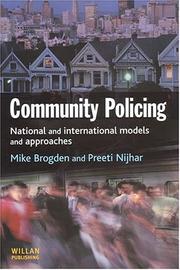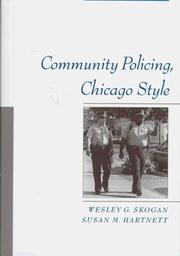| Listing 1 - 10 of 24 | << page >> |
Sort by
|

ISBN: 1134009100 1283966514 1282077392 1134009038 9786612077395 1843925796 9781134009039 9781843925798 9781134009107 1843920069 9781843920069 1843920050 9781843920052 9781283966511 9781282077393 6612077395 9781134009176 Year: 2005 Publisher: Cullompton Willan
Abstract | Keywords | Export | Availability | Bookmark
 Loading...
Loading...Choose an application
- Reference Manager
- EndNote
- RefWorks (Direct export to RefWorks)
Community policing has been a buzzword in Anglo-American policing for the last two decades, somewhat vague in its definition but generally considered to be a good thing. In the UK the notion of community policing conveys a consensual policing style, offering an alternative to past public order and crimefighting styles. In the US community policing represents the dominant ideology of policing as reflected in a myriad of urban schemes and funding practices, the new orthodoxy in North American policing policy-making, strategies and tactic. But it has also become a massive export to non-western
Community policing --- Community policing. --- Community-based policing --- Community-oriented policing --- COP (Community-oriented policing) --- Neighborhood policing --- Policing, Community --- Proximity policing --- Police
Book
ISBN: 1784027995 1452276102 1452276110 9781452276106 9781452276113 9781506307770 1506307779 9781452235295 1452235295 1506318177 Year: 2013 Publisher: Thousand Oaks, Calif. : SAGE Reference,
Abstract | Keywords | Export | Availability | Bookmark
 Loading...
Loading...Choose an application
- Reference Manager
- EndNote
- RefWorks (Direct export to RefWorks)
Originating during police reform efforts of the 1970s, the philosophy of community policing is currently widespread. What sorts of collaborative partnerships have evolved between policing agencies and the individuals and communities they serve? How do police departments engage in systematic examination of identified problems to develop effective responses? How have police departments aligned their organizational structures to best support community partnerships and proactive problem solving? Just how effective have efforts at community policing been? These questions and more are explored in this new reference work.
Community policing --- Police-community relations --- Police --- Public relations --- Community-based policing --- Community-oriented policing --- COP (Community-oriented policing) --- Neighborhood policing --- Policing, Community --- Proximity policing --- E-books --- Crime.
Book
ISBN: 9781593327842 1593327846 1593327625 9781593327620 Year: 2014 Publisher: El Paso
Abstract | Keywords | Export | Availability | Bookmark
 Loading...
Loading...Choose an application
- Reference Manager
- EndNote
- RefWorks (Direct export to RefWorks)
Community policing is in decline, threatened with obsolescence by data-driven practices like COMPSTAT and Intelligence-Led Policing. Efficiency driven and aided by technology, these practices are delivering on the crime reduction promises community policing aspired to. Ray argues that much of community policing's difficulties lie in the lack of a clear theoretical foundation informing its community engagement mandate. The uncritical incorporation of pluralism needlessly highlights the differences between police and community groups. Deliberative democratic theory offers a theoretical foundatio
Community policing --- Community-based policing --- Community-oriented policing --- COP (Community-oriented policing) --- Neighborhood policing --- Policing, Community --- Proximity policing --- Police --- E-books --- Community policing.
Book
ISBN: 128359739X 9786613909848 0833053256 0833053205 9780833053251 9780833053206 9781283597395 Year: 2011 Publisher: Santa Monica, CA Rand Corporation
Abstract | Keywords | Export | Availability | Bookmark
 Loading...
Loading...Choose an application
- Reference Manager
- EndNote
- RefWorks (Direct export to RefWorks)
Advances in technology and operating concepts are driving significant changes in the day-to-day operations of future police forces. This book explores potential visions of the future of policing, based on the drivers of jurisdiction, technology, and threat, and includes concrete steps for implementation. The analysis is based on a review of policing methods and theories from the 19th century to the present day.
Law enforcement -- Technological innovations. --- Police. --- Police --- Law enforcement --- Social Welfare & Social Work --- Social Sciences --- Criminology, Penology & Juvenile Delinquency --- Technological innovations --- Community policing. --- Community-based policing --- Community-oriented policing --- COP (Community-oriented policing) --- Neighborhood policing --- Policing, Community --- Proximity policing
Book
ISBN: 1911529447 1911529455 Year: 2018 Publisher: London : Ubiquity Press,
Abstract | Keywords | Export | Availability | Bookmark
 Loading...
Loading...Choose an application
- Reference Manager
- EndNote
- RefWorks (Direct export to RefWorks)
Community policing has often been promoted, particularly in liberal democratic societies, as the best approach to align police services with the principles of good security sector governance (SSG). The stated goal of the community policing approach is to reduce fear of crime within communities, and to overcome mutual distrust between the police and the communities they serve by promoting police citizen partnerships. This SSR Paper traces the historical origins of the concept of community policing in Victorian Great Britain and analyses the processes of transfer, implementation, and adaptation of approaches to community policing in Imperial and post-war Japan, Singapore, and Timor-Leste. The study identifies the factors that were conducive or constraining to the establishment of community policing in each case. It concludes that basic elements of police professionalism and local ownership are necessary preconditions for successfully implementing community policing according to the principles of good SSG. Moreover, external initiatives for community policing must be more closely aligned to the realities of the local context.
Development studies --- Emergency services --- Politics & government --- Warfare & defence --- Peacekeeping operations --- Criminal procedure --- Community policing --- Community-based policing --- Community-oriented policing --- COP (Community-oriented policing) --- Neighborhood policing --- Policing, Community --- Proximity policing --- Police

ISBN: 1282384120 9786612384127 1423760646 0195350448 1602567654 9781423760641 9786610533787 6610533784 9780195105605 0195105605 0195105605 0195136330 9780195136333 Year: 1997 Publisher: New York Oxford University Press
Abstract | Keywords | Export | Availability | Bookmark
 Loading...
Loading...Choose an application
- Reference Manager
- EndNote
- RefWorks (Direct export to RefWorks)
Police departments across America have been reinventing themselves, adopting a new style known as community policing. This book examines how Chicago has implemented this new type of law enforcement.
Community policing --- Public relations --- Business --- Industries --- PR (Public relations) --- Advertising --- Industrial publicity --- Mass media and business --- Propaganda --- Publicity --- Community-based policing --- Community-oriented policing --- COP (Community-oriented policing) --- Neighborhood policing --- Policing, Community --- Proximity policing --- Police
Book
ISBN: 1283864479 0813552354 9780813552354 Year: 2011 Publisher: New Brunswick, NJ
Abstract | Keywords | Export | Availability | Bookmark
 Loading...
Loading...Choose an application
- Reference Manager
- EndNote
- RefWorks (Direct export to RefWorks)
In recent years, community policing has transformed American law enforcement by promising to build trust between citizens and officers. Today, three-quarters of American police departments claim to embrace the strategy. But decades before the phrase was coined, the New York City Housing Authority Police Department (HAPD) had pioneered community-based crime-fighting strategies. The Last Neighborhood Cops reveals the forgotten history of the residents and cops who forged community policing in the public housing complexes of New York City during the second half of the twentieth century. Through a combination of poignant storytelling and historical analysis, Fritz Umbach draws on buried and confidential police records and voices of retired officers and older residents to help explore the rise and fall of the HAPD's community-based strategy, while questioning its tactical effectiveness. The result is a unique perspective on contemporary debates of community policing and historical developments chronicling the influence of poor and working-class populations on public policy making.
Public housing --- Community policing --- Government housing projects --- Social housing --- Low-income housing --- Community-based policing --- Community-oriented policing --- COP (Community-oriented policing) --- Neighborhood policing --- Policing, Community --- Proximity policing --- Police

ISBN: 1135989435 1281331589 9786611331580 184392434X 9781135989439 9781843924340 1903240549 9781903240540 9781281331588 6611331581 9781135989507 9781135989576 9780415627559 1135989508 Year: 2002 Publisher: Cullompton Willan
Abstract | Keywords | Export | Availability | Bookmark
 Loading...
Loading...Choose an application
- Reference Manager
- EndNote
- RefWorks (Direct export to RefWorks)
Community-based crime control has become one of the principal policy responses to crime and disorder across western societies, and is regarded now as one of the keys to successful crime prevention and reduction. The aim of this book is to bring together findings from case studies of community-based crime control in England as a means of examining the prospects for this approach, its evolving relationship with criminal justice and social policies, and to assess the lessons internationally that can be drawn from this in the theory, research methods, politics and practice of crime control.
Community policing --- Crime prevention --- Crime --- Prevention of crime --- Public safety --- Community-based policing --- Community-oriented policing --- COP (Community-oriented policing) --- Neighborhood policing --- Policing, Community --- Proximity policing --- Police --- Citizen participation. --- Prevention --- Government policy
Book
ISBN: 3030436357 3030436349 Year: 2020 Publisher: Cham : Springer International Publishing : Imprint: Springer,
Abstract | Keywords | Export | Availability | Bookmark
 Loading...
Loading...Choose an application
- Reference Manager
- EndNote
- RefWorks (Direct export to RefWorks)
This book explores multi-year community-based crime prevention initiatives in the United States, from their design and implementation, through 5-year follow ups. It provides an overview of programs of various sizes, affecting diverse communities from urban to rural environments, larger and smaller populations, with a range of site-specific problems. The research is based on a United States federally-funded program called the Byrne Criminal Justice Initiative (BJCI) which began in 2012, and has funded programs in 65 communities, across 28 states and 61 cities. This book serves to document the process, challenges, and lessons learned from the design and implementation of this innovative program. It covers researcher-practitioner partnerships, crime prevention planning processes, programming implementation, and issues related to sustainability of community-policing initiatives that transcend institutional barriers and leadership turnover. Through researcher partnerships at each site, it provides a rich dataset for understanding and comparing the social and economic problems that contribute to criminality, as well as the conditions where prosocial behavior and collective efficacy thrive. It also examines the future of this federally-funded program going forward in a new Presidential administration. This work will be of interest to researchers in criminology and criminal justice, particularly with an interest in translational/applied criminology and crime prevention, as well as related fields such as public policy, urban planning, and sociology.
Community policing. --- Community-based policing --- Community-oriented policing --- COP (Community-oriented policing) --- Neighborhood policing --- Policing, Community --- Proximity policing --- Police --- Crime—Sociological aspects. --- Public policy. --- Social work. --- Crime and Society. --- Public Policy. --- Social Work. --- Benevolent institutions --- Philanthropy --- Relief stations (for the poor) --- Social service agencies --- Social welfare --- Social work --- Human services

ISBN: 132241713X 0761924728 1452262799 9781452262796 9781452229478 1452229473 0761924736 9780761924739 9780761924739 0761924736 Year: 2002 Publisher: Thousand Oaks, CA : Sage Publications,
Abstract | Keywords | Export | Availability | Bookmark
 Loading...
Loading...Choose an application
- Reference Manager
- EndNote
- RefWorks (Direct export to RefWorks)
This book examines the experiences of a wide variety of community policing initiatives in the United States.
Community policing. --- Organizational change. --- Police administration. --- Police training. --- Police --- Police professionalization --- Training --- Police management --- Management --- Change, Organizational --- Organization development --- Organizational development --- Organizational innovation --- Organization --- Manpower planning --- Community-based policing --- Community-oriented policing --- COP (Community-oriented policing) --- Neighborhood policing --- Policing, Community --- Proximity policing --- Training of --- Administration
| Listing 1 - 10 of 24 | << page >> |
Sort by
|

 Search
Search Feedback
Feedback About UniCat
About UniCat  Help
Help News
News